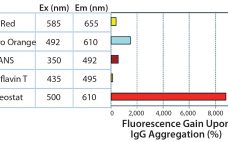Development of a single drug, whether it is a new chemical entity, biotherapeutic, or cellular therapy, requires significant investment of resources. Care must be taken to choose analytical methods that are fit for the purpose of monitoring products and contaminants in the process. With expertise in labeling and detection, Enzo offers solutions to help rapidly analyze protein stability and integrity for all your bioprocessing needs. Protein Aggregation
Analytical Methods and Instrumentation
Rapid Affinity and IgG Titer Analytics: Automating Bioanalysis with Gyrolab Nanoliter-Scale Technology
In the development of biotherapeutics, there is a need to quantitate antibody titer and to characterize antibody affinity against the target of interest. Such analyses are often challenged by the need for sensitivity, reproducibility, and higher throughput. Gyrolab systems automate and miniaturize affinity measurements and IgG titer quantification in a single platform using only nanoliter volumes with rapid time to results. IgG Titer Immunoassays with Broader Ranges for Cell Line Development
Rapid HCP Immunoassay Kit Selection: One HCP Kit Does Not Cover All Possible HCP Mixtures
Host cell protein (HCP) levels in biologics are on the critical path for assessing product quality, and they pose a serious risk to drug safety. The challenge is to accurately quantify a complex mixture of HCP impurities, which vary in properties and abundance depending on cell line, media, and process parameters. HCP immunoassay analysis is based on polyclonal antibodies raised against HCPs from nontransfected cell lines. How well a particular HCP assay recognizes all proteins depends on how well the…
Maximize Your Discovery and Development Productivity with Automated nanoDSF
Assessment of thermal stability parameters of biologics is an integral part of biopharmaceutical research. The ever-growing number of biologics in development pipelines worldwide demands rapid and precise methods to quickly screen large sets of conditions in an easy and straight-forward manner. In a recent study, we compared two methods for detection of thermal unfolding transition temperatures (Tm) of a therapeutic monoclonal antibody (MAb): nanoDSF, which analyzes changes in the fluorescence emission properties of proteins, and differential scanning calorimetry (µDSC), which…




